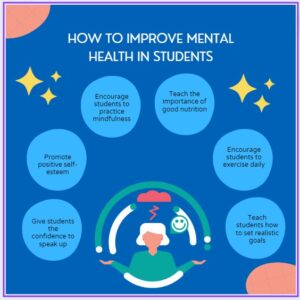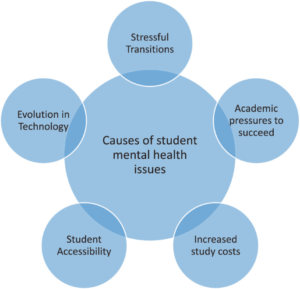Nurturing Mental Wellness:
A Guide for Teachers and Students
In today’s fast-paced world, the pressure on students and educators alike is immense. Academic stress, coupled with other life challenges, can significantly impact mental health. As teachers and students, it’s crucial to recognize the signs of distress and have coping mechanisms in place to address these issues effectively. In this blog, we’ll explore strategies for both teachers and students to promote mental wellness in the educational context.

Strategies for Teachers:
- Create a Supportive Environment: Foster an open and accepting classroom atmosphere where students feel comfortable discussing their emotions and seeking help when needed.
- Educate Yourself: Take the time to learn about common mental health issues among students and familiarize yourself with available resources for support.
- Normalize Mental Health Conversations: Incorporate discussions about mental health into your curriculum to reduce stigma and increase awareness among students.
- Offer Flexible Learning Options: Recognize that every student has different needs and capabilities. Provide options for alternative assessments and accommodations for students experiencing mental health challenges.
- Refer to Mental Health Professionals: If you notice signs of severe distress in a student, don’t hesitate to refer them to a school counsellor or mental health professional for further assistance.

Coping Strategies for Students:
- Practice Self-Care: Make time for activities that promote relaxation and well-being, such as exercise, mindfulness, and hobbies.
- Set Realistic Goals: Break down larger tasks into smaller, manageable goals to avoid feeling overwhelmed by academic pressure.
- Seek Support: Reach out to trusted friends, family members, or school counsellors for emotional support and guidance.
- Develop Time Management Skills: Create a study schedule that allows for adequate rest and leisure time, and prioritize tasks based on importance and deadlines.
- Challenge Negative Thoughts: Practice reframing negative self-talk and cultivating a positive mind-set through techniques like cognitive-behavioural therapy (CBT).
Indian Mental Health Resources:
- National Institute of Mental Health and Neurosciences (NIMHANS): NIMHANS is a premier mental health institution in India that offers clinical services, research, and training programs.
- Vidya Sagar Institute of Mental Health and Neurosciences: This institute provides mental health services, including diagnosis, treatment, and rehabilitation, and conducts community outreach programs.
- The Live Love Laugh Foundation: Founded by actress Deepika Padukone, this organization aims to raise awareness about mental health issues and reduce stigma through various campaigns and initiatives.
- iCALL Psychosocial Helpline: iCALL is a telephone and email-based counselling service that offers emotional support and mental health assistance to individuals in distress.
Remember, prioritizing mental health is essential for both teachers and students to thrive academically and personally. By implementing these strategies and utilizing available resources, we can create a supportive educational environment where everyone feels valued and supported in their mental wellness journey.
[Disclaimer: This blog provides general information and suggestions and is not a substitute for professional mental health advice. If you or someone you know is experiencing severe distress please seek help from a qualified mental health professional.]
Latest Post
-
 Beyond Genres, Beyond Geographies: Curating a Singular Experience for the Modern Reader31 Jul 2024
Beyond Genres, Beyond Geographies: Curating a Singular Experience for the Modern Reader31 Jul 2024 -
 Personalizing Your Space: How to Create a Productive Reading Nook24 Jul 2024
Personalizing Your Space: How to Create a Productive Reading Nook24 Jul 2024 -
 The Science Behind Ambiance at Deepa’s Reading Room: Enhancing Reading Efficiency through Environment18 Jul 2024
The Science Behind Ambiance at Deepa’s Reading Room: Enhancing Reading Efficiency through Environment18 Jul 2024 -
 The Digital Age vs Traditional Reading Spaces:Deepa's Perspective12 Jul 2024
The Digital Age vs Traditional Reading Spaces:Deepa's Perspective12 Jul 2024 -
 Unwind, Unplug, and Unleash: The Rebirth of Reading Rooms as Self-Care Sanctuaries26 Jun 2024
Unwind, Unplug, and Unleash: The Rebirth of Reading Rooms as Self-Care Sanctuaries26 Jun 2024
Book your seat now
Book your seat now and indulge in an environment tailored for academic excellence. Your study oasis awaits – reserve your spot today!


